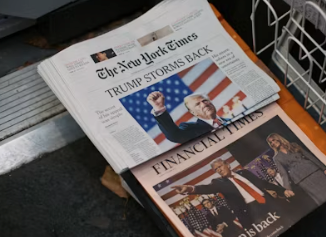$DIS $AMZN #FilmIndustry #Tariffs #UKFilm #USTrade #GlobalEconomy #Cinemas #Hollywood #BritishCinema #TradeWar #MovieBusiness #Economics
Will Trump’s Movie Tariff Threat Crush Britain’s Film Industry?
In light of trump’s news regarding potential tariffs on foreign-made films, Britain’s film sector is already reeling from slow box office recovery and escalating production costs. As the industry grapples with these challenges, the looming threat of a 100% tariff on movies imported from the UK could amplify the existing difficulties faced by filmmakers, studios, and distributors alike.
The British film industry has enjoyed a rich legacy, producing groundbreaking films and nurturing talented individuals. However, the current economic landscape presents significant hurdles. Slow box office recoveries post-pandemic have left many production houses in precarious positions, while rising costs associated with production and distribution further complicate the situation. The introduction of tariffs could be the final nail in the coffin for many companies struggling to stay afloat.
The Economic Impact of Tariffs on British Cinema
Should the U.S. implement these tariffs, the ramifications will likely extend beyond financial losses. The film industry is a vital component of the UK economy, contributing billions in revenue and providing thousands of jobs. A sudden increase in costs for importing films could lead to a reduction in the diversity of content available to British audiences. This contraction may also deter international collaborations, which have been crucial for the success of numerous projects.
Moreover, the potential for retaliatory tariffs from the UK could lead to a tit-for-tat situation, further destabilizing the industry. If British films face increased tariffs in the U.S. market, this could limit opportunities for filmmakers to reach lucrative audiences across the Atlantic. The implications of such actions may ripple through the entire economic landscape, affecting not only the film sector but also related industries such as tourism and advertising.
How Will the Industry Adapt?
In response to the looming threat, stakeholders in the British film industry must consider innovative strategies to mitigate the impact of these tariffs. Exploring alternative distribution channels, enhancing local productions, and tapping into emerging digital platforms may provide some relief. As consumer behavior shifts towards streaming services, a focus on creating high-quality, localized content could help sustain the industry during turbulent times.
Furthermore, industry leaders must engage in proactive dialogues with policymakers to advocate for measures that will protect their interests. Initiatives could include lobbying for exemptions or reduced tariffs for certain genres or productions that significantly contribute to the cultural fabric of both the UK and the U.S.
Looking Ahead: The Future of British Film
As the uncertainty surrounding U.S. tariffs unfolds, the British film industry stands at a crossroads. With a rich history of storytelling and creativity, it must navigate these turbulent waters to emerge resilient. The combination of economic strategies, government support, and industry collaboration will be crucial in determining the long-term sustainability of Britain’s cinematic landscape.
In conclusion, the potential for U.S. tariffs on foreign-made films poses a significant threat to Britain’s already struggling film industry. The need for adaptability and innovation has never been more pressing. For more insights on the economic implications affecting various sectors, explore our stock analysis and stay informed on the latest industry developments. The future of Britain’s film industry may depend on its ability to respond effectively to these challenges.







Comments are closed.